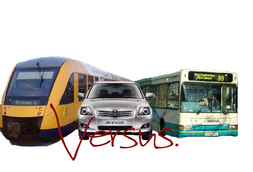
Project | Dynamics in Mode Choice Behaviour |
Funding: | KiM/Goudappel Coffeng/UT |
Duration: | 2014-2021 |
PhD student | |
Supervisor: | |
Daily supervisor |
Abstract
In most countries, including the Netherlands, the understanding of people’s travel behaviour is based on cross-sectional one-day travel surveys; i.e. only one day is surveyed for each respondent. This is not sufficient to gain a proper understanding of the dynamics in travel behaviour. Little is known about the temporal dynamics in mode choice behaviour on household and individual level. An opportunity to describe and understand these dynamics is offered by panel surveys, where data is collected from a sample of respondents (panel) at different points in time. In fall 2013, the Netherlands Institute for Transport Policy Analysis, the University of Twente and Goudappel Coffeng jointly started the Mobility Panel Netherlands (MPN). The MPN will continue at least for four years and comprises a yearly three-day trip diary among 2,000 Dutch households (4,500 persons from the age of 12). Therefore, the MPN is the largest ongoing mobility panel in the Netherlands (see MPN site). The MPN collects information on activity patterns and travel behaviour over time, as well as information on interactions between household members, life-events, preferences towards travel modes, and various other personal and household characteristics. Part of this research project is to set-up an additional questionnaire about attitudes and behaviour towards transport modes. The MPN data will be used in this research project. As far as known, this is the only dataset in the world with this size and characteristics.
The main goal of this research project is to obtain a better understanding of the dynamics in transport mode choice behaviour of households and individuals. Successively, the following topics will be examined in the next four years:
- household interaction, travel patterns and mode choice behaviour: analysis of interactions within households and in which way these dependencies influence mode choice behaviour of the individual members in the household.
- life events on the labour market, household interaction and mode choice behaviour: in which situations and to which extent are life-events on the labour market and household interactions related and cause changes in mode choice behaviour.
- attitudes towards transport modes: analysis of attitudes towards transport modes of different groups (e.g., elderly, young adults, households with or without children, highly educated) over time and determining the causal relations between attitudes and mode choice.
- temporal dynamics in car use: measure and understand dynamics in car use over time; overall analyses of trends in mode choice behaviour with special focus on car use and taken into account the results of the previous analyses (household interaction, life-events and attitudes).
More information: k.t.geurs@utwente.nl
